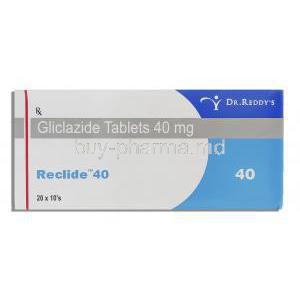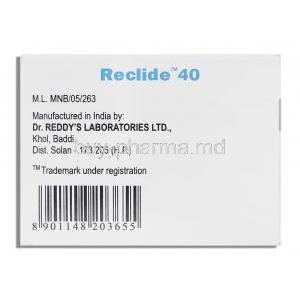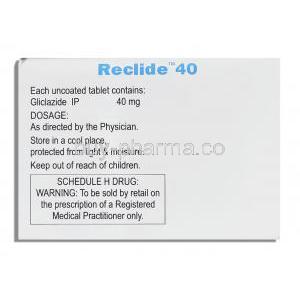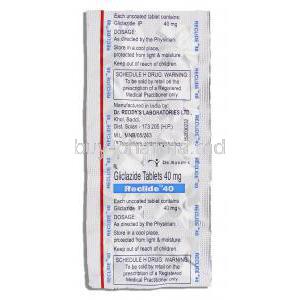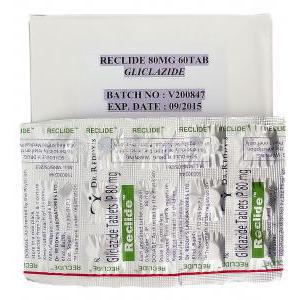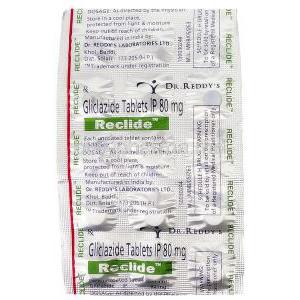Gliclazide
Introduction
Gliclazide is a medication taken orally to help manage type 2 diabetes. It belongs to a class of drugs called sulfonylureas and works by stimulating the pancreas to release insulin, which helps control blood sugar levels. Gliclazide was developed in the 20th century and is considered part of the second generation of sulfonylureas. Compared to versions, it has a more favorable side effect profile and is more effective in treating diabetes as a sulfonylurea; Gliclazide functions as an insulin secretagogue. It acts uniquely among oral antidiabetic medications and provides specific therapeutic benefits.
Uses of Gliclazide
Gliclazide is an oral medication that is primarily used to treat type 2 diabetes mellitus, a condition characterized by insulin resistance and decreased insulin secretion 1. Gliclazide works by binding to receptors on pancreatic β cells, which stimulates the release of insulin. This insulin then aids in the uptake of glucose by cells leading to a reduction in blood glucose levels 1.
There are benefits associated with using Gliclazide for managing diabetes including improved glycemic control, a decrease in diabetes-related complications, and enhanced metabolic parameters 1.
How It Works
Pharmacodynamics: How it works on β cells When you take Gliclazide, it specifically targets the ATP-sensitive potassium channels in the β cells. This causes the cells to depolarize. Allows calcium to enter, which eventually leads to the release of insulin. Boosting insulin secretion Gliclazide's primary function is increasing the amount of insulin your body naturally produces. Doing this directly addresses one of the factors in type 2 diabetes. Impact on blood glucose levels: Gliclazide progressively lowers blood glucose levels by enhancing insulin secretion. This helps achieve control over glycemic levels in patients.
Off-label Use
Gliclazide has been studied for its benefits in preventing cardiovascular disease. Several studies have shown that Gliclazide has protective effects indicating that it may have benefits beyond just controlling glucose levels. One study found that gliclazide has protective effects on high glucose and advanced glycation end products (AGEs)-induced injury of human mesangial cells and renal tubular epithelial cells via inhibiting RAGE-NADPH oxidase-NF-kB pathway 1. Another study found that gliclazide is associated with the greatest beneficial impact on cardiovascular mortality, and the lowest incidence of severe hypoglycaemia 2.
Moreover, some studies suggest that Gliclazide may have additional benefits such as reducing stress 3 and improving endothelial function 4. However, it is important to approach these uses with caution and monitor for hypoglycemic episodes 3.
Dosage and Administration
Usually, Gliclazide is initially prescribed at doses and can be increased depending on blood glucose levels and how well the patient tolerates it. The dosage is adjusted to meet needs considering factors such as kidney function, age, and other medications being taken. It is typically taken twice daily, preferably with meals to coincide with increased blood glucose after eating.
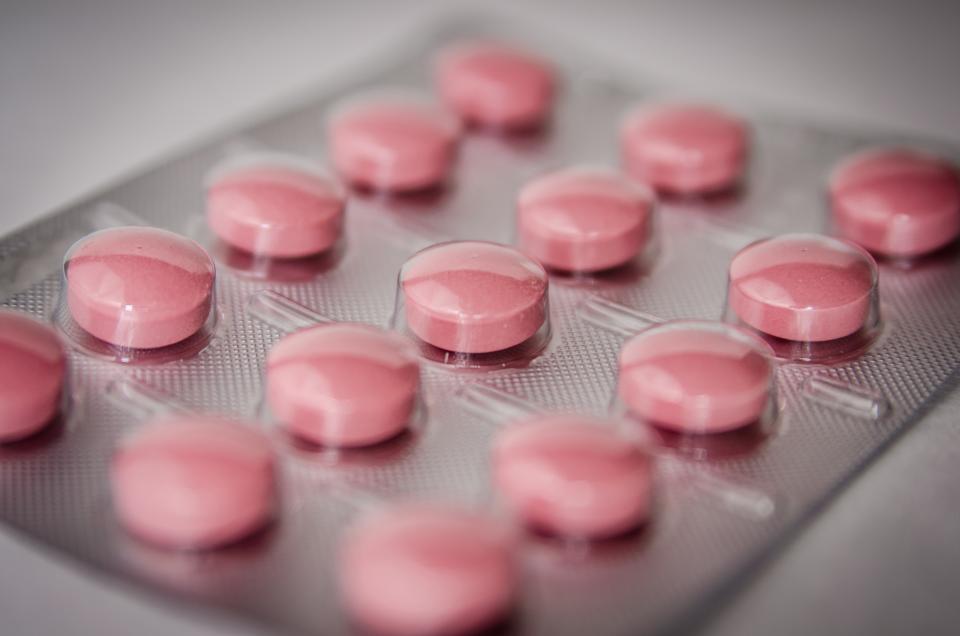
Composition
The main component of Gliclazide, an ingredient, is a complex molecule that affects different pathways within the pancreas. To ensure that the drug is delivered effectively and remains stable, formulations may include ingredients, like binders, fillers, and stabilizers. There are brands and versions available, including modified release options, designed to meet patients' specific needs and preferences and their clinical requirements.
Storage
It is recommended to store Gliclazide at room temperature from moisture and direct sunlight to maintain its effectiveness. Like any medication, Gliclazide has a shelf life, after which its safety and efficacy may be uncertain. It is essential to handle and dispose of expired medicines, preferably by returning them to a pharmacy, to avoid potential risks.
Interaction
Drug-drug interactions involving medications should be taken into consideration when prescribing Gliclazide. It's important to be cautious when combining it with beta-blockers or antifungals. Additionally, the consumption of grapefruit and its derivatives might impact how Gliclazide is metabolized, potentially affecting its effectiveness. It's crucial to note that consuming alcohol while taking Gliclazide can increase the risk of experiencing hypoglycemia and should be avoided.
Side Effects
Recognizing the potential for side effects: Every treatment or medication, despite its benefits, carries the risk of consequences. Being aware of these outcomes is crucial for patient safety and making informed choices. Distinguishing between common and uncommon side effects can vary in how they occur, with some being more commonly experienced while others are rare but have the potential to be severe abnormalities.
Common Side Effects
Gastrointestinal issues: Feeling nauseous, vomiting, and experiencing discomfort in the abdomen are side effects that can occur. Skin reactions and rashes: Occasionally, you may notice changes on your skin, like redness or itchiness. Changes in blood cell count: While less common, there may be abnormalities in your blood cells, such as platelet count or low white blood cell count.
Warning
There are rare but significant risks associated with the use of this medication. These include experiencing hypoglycemia, liver problems, or allergic reactions. If you notice symptoms such as confusion, trembling, rapid heartbeat, or in some cases loss of consciousness due to low blood sugar levels, it is essential to take immediate action. When you identify any side effects, seek medical advice promptly. Depending on the guidance of a healthcare professional, it may be advisable to stop taking the medication.
Contraindication
Certain health conditions make it unwise to use Gliclazide, such as type 1 diabetes, diabetic ketoacidosis, or severe renal impairment. It is advisable to avoid Gliclazide in these cases. In addition to health statuses, there are also situations where its use should be avoided, like when certain medications are taken concurrently or if hypersensitivity to sulfonylureas.
Careful Administration
Monitoring and evaluation throughout therapy is essential to ensure its safety and effectiveness. It is important to check blood glucose levels, assess liver function, and monitor for any signs of hypoglycemia. Adjusting the treatment plan based on how the patient responds helps maximize its efficacy while minimizing risks.
Important Precautions
Individuals who have liver problems and cardiovascular diseases. Are undergoing surgery need to be carefully monitored while taking Gliclazide. There may be situations such as surgery, trauma, or other illnesses where the medication dosage needs to be adjusted or temporarily stopped.
Administration to Specific Populations
Elderly: In adults, kidney function may be affected, so it may be necessary to reduce and closely monitor the dose. Pregnant Women and Nursing Mothers: The safety of Gliclazide during pregnancy and breastfeeding is still not fully established, so its use should be carefully evaluated, considering the risks and benefits. Children: There is a lack of data on the safety and effectiveness of Gliclazide in children, so a cautious approach is necessary.
Overdosage
Recognizing the indications and manifestations of an overdose: Consuming excessive amounts of Gliclazide may result in hypoglycemia, which can be identified by symptoms such as dizziness, excessive sweating, and, in extreme cases, coma. The initial course of action involves consuming carbohydrates to stabilize blood sugar levels. Following this, continuous medical supervision and intervention should be implemented as necessary.

Handling Precautions
It is essential to handle and dispense Gliclazide safely by providing instructions to patients and storing it out of reach of children. When it comes to disposing of expired medication, it is recommended to use proper pharmaceutical disposal systems to protect the environment and prevent accidental consumption.


